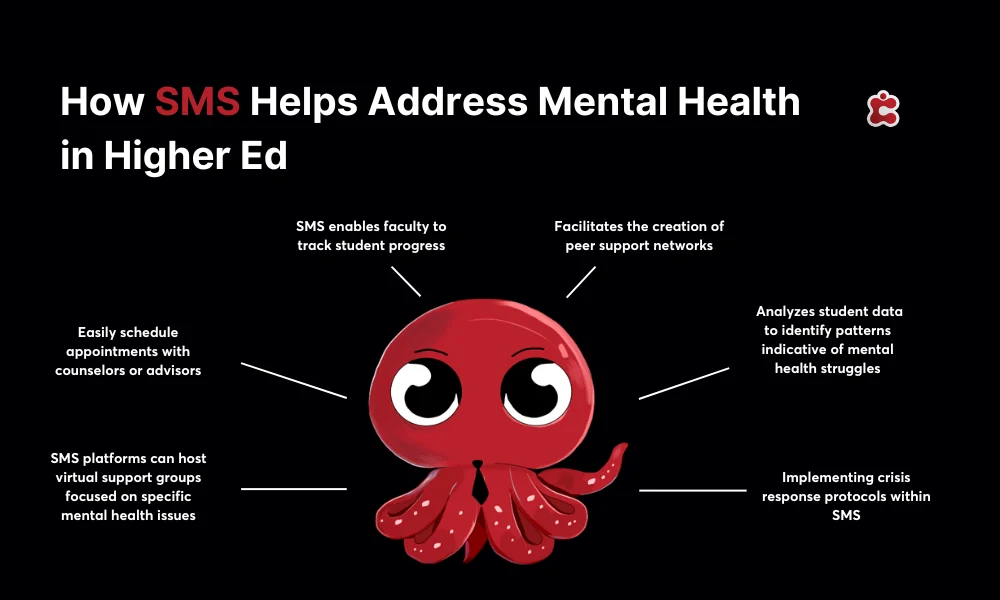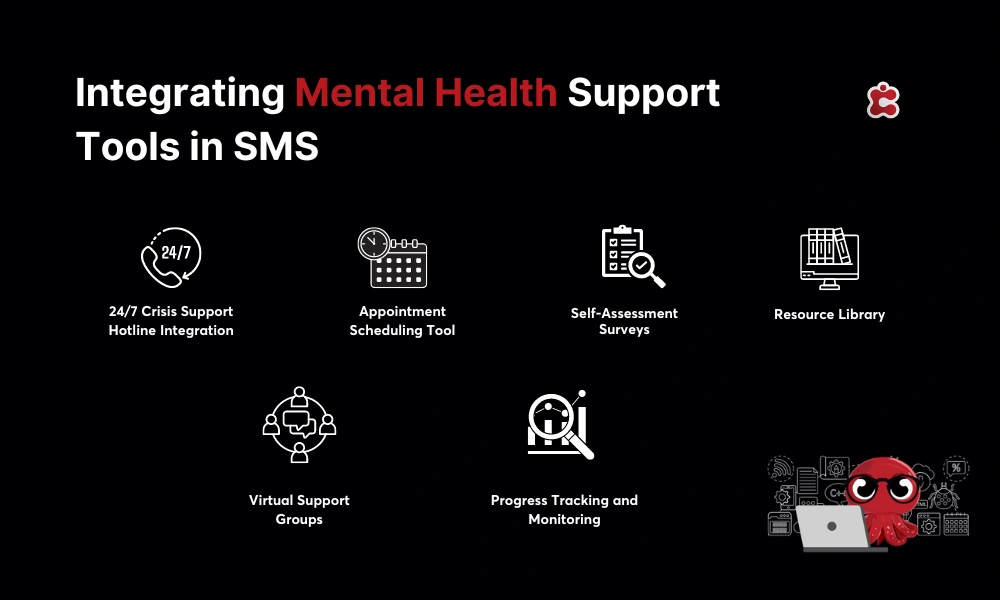Mental health is not just a term coined for clinical settings. As academic pressures, social expectations, and personal challenges intersect, students find themselves feeling overwhelmed and anxious. In recent years, these challenges have gained significant attention, with around one in six undergraduates now reporting experiencing mental health issues.
The responsibility falls upon colleges and universities to provide their students with the support they need. So how can institutions help their students navigate these waters? One innovative approach gaining traction is the integration of mental health support systems directly into School Management Systems.
Imagine a student logging into their portal not just to check their grades, but also to access resources that support their holistic educational journey. By properly integrating the right tools and software, a School Management System can turn this vision into reality and nurture the holistic well-being of your students.

Mental Health in Higher Education
Mental health challenges among college students can manifest in various forms such as stress, anxiety, depression, and more severe conditions. The transition to college life often brings about newfound independence, academic pressures, financial stressors, social adjustments, and the absence of familiar support systems. Despite the growing recognition of mental health issues among college students, higher education institutions encounter several challenges in effectively addressing and supporting the mental well-being of their students.
- Higher education institutions often face resource constraints when it comes to mental health services. Budget limitations may restrict the availability of counseling centers, psychiatric services, and other support programs.
- Siloed structures, bureaucratic hurdles, and communication barriers often impede seamless collaboration and hinder the delivery of comprehensive care for students.
- Geographic barriers, financial constraints, cultural differences, and language barriers may prevent certain student populations from seeking or receiving adequate support.
- Collecting comprehensive and accurate data on mental health indicators, student utilization of services, and outcomes of interventions can be challenging.
Addressing these challenges requires a multifaceted approach. However, School Management Systems represent a transformative step toward creating inclusive, resilient, and thriving campus communities.
How SMS Creates a Supportive Environment
By leveraging the capabilities of SMS, educational institutions can create a supportive environment for students and faculty members. Stakeholders can easily access resources, communicate seamlessly, and receive personalized support.
- Accessibility: Students and faculty can easily access mental health resources without the need for additional logins or navigation to separate platforms, increasing the likelihood of engagement and utilization.
- Visibility: Placing mental health resources prominently within student portals and administrative interfaces of the SMS raises awareness of available support services and encourages individuals to proactively seek help when needed.
- Convenience: Integrating mental health resources into familiar platforms simplifies the process of accessing support, reducing barriers such as time constraints or uncertainty about where to find assistance.
- Privacy: By accessing mental health resources within secure student portals of the SMS, individuals can feel confident in their privacy and confidentiality.
- Seamless Communication: SMS facilitates seamless communication between students, faculty, and professionals, facilitating referrals, scheduling appointments, and sharing important information in real time. Ultimately, breaking down siloed structures, bureaucratic hurdles, and communication barriers
- Data Integration: Incorporating resources into school management systems allows for the integration of data related to student well-being, enabling institutions to track trends, measure outcomes, and make data-informed decisions.
- Customization: Tailoring mental health resources within student portals and administrative interfaces allows institutions to provide personalized support based on individual needs and preferences, enhancing the effectiveness of interventions.
Integrating Tools into School Management Systems
Incorporating mental health resources directly into student portals and administrative interfaces within the SMS is crucial for creating a supportive campus environment. Providing easy access to mental health resources ensures that support is readily available whenever needed, promoting a proactive approach to mental health care and empowering individuals to seek help when facing challenges. Some features and tools that can be integrated into a School management system include:
- 24/7 Crisis Support Hotline Integration: Direct access to a crisis support hotline within the student portal for immediate assistance during emergencies.
- Appointment Scheduling Tool: A user-friendly appointment scheduling tool that allows students to easily book appointments with counselors or professionals.
- Self-Assessment Surveys: Interactive self-assessment surveys embedded within the administrative interface to help students identify and understand their mental health needs.
- Resource Library: A comprehensive resource library featuring articles, videos, and guides on various mental health topics accessible within the student portal for self-help and education.
- Virtual Support Groups: Integration of virtual support groups and discussion forums within the student portal to foster peer support and connection.
- Wellness Challenges and Activities: Incorporation of wellness challenges, activities, and mindfulness exercises within the student portal to promote self-care and resilience.
- Progress Tracking and Monitoring: Tools for tracking and monitoring students’ progress in utilizing mental health resources, including attendance records, utilization rates, and outcomes data, are integrated into administrative interfaces for data analysis and decision-making.
Using Data to Drive Proactive Measures
Data derived from the school management system serves as a valuable resource for higher education institutions in driving proactive measures to address mental health issues. By analyzing indicators such as academic performance, attendance records, campus involvement, and utilization of support services, institutions can flag students who may be at risk. Moreover, advanced data analytics techniques, such as predictive modeling and risk assessment, can anticipate future mental health needs. Institutions can proactively intervene to mitigate risks, prevent crises, and promote resilience among students. Data analytics also enable institutions to personalize interventions and support services based on individual student needs and preferences. Whether through targeted outreach, specialized programs, or peer support initiatives, personalized interventions can enhance engagement and effectiveness.

The Future of Support Tools
As higher education institutions continue to prioritize student well-being, the future of mental health support holds exciting prospects. In the coming years, advancements in technology will revolutionize the way mental health services are delivered, accessed, and tailored to meet the needs of students. AI-powered chatbots and virtual assistants have the potential to provide immediate support and guidance to students experiencing mental health challenges. AI algorithms can offer personalized recommendations, coping strategies, and crisis intervention in real time. Machine learning algorithms can also assist in predicting mental health trends, identifying at-risk students, and tailoring interventions.
Virtual reality therapy offers immersive experiences designed to alleviate symptoms of anxiety, depression, and PTSD by exposing individuals to virtual environments that simulate real-life scenarios. In higher education, VR therapy can provide students with a safe and controlled space to practice coping skills, confront fears, and receive exposure therapy
Telehealth platforms enable students to access mental health services remotely, overcoming barriers such as geographic location, transportation, and scheduling conflicts. Through secure video conferencing, messaging, and teletherapy sessions, students can connect with licensed counselors, psychologists, and psychiatrists
Classter’s SMS for Mental Health Support
Classter School Management System stands at the forefront of addressing mental health challenges in higher education by integrating comprehensive support systems into its platform. By centralizing all aspects of school operations and leveraging technology to bridge the gap between home and school, Classter ensures that students receive personalized support. Through, real-time academic tracking, integrated communication tools, robust reporting and analytics, Classter empowers educational institutions to create a supportive and efficient environment conducive to mental health and academic success.
Experience the transformative power of Classter School Management System in promoting student well-being and academic excellence. Contact us today to learn more about how Classter can support your institution in
FAQ’s
School management systems streamline administrative processes, facilitate communication, and provide access to mental health resources within student portals, creating a supportive environment for students.
Look for features such as integrated communication tools, appointment scheduling for counseling services, self-assessment surveys, resource libraries, virtual support groups, and progress-tracking capabilities.
Classter integrates comprehensive mental health support systems into its platform, offering real-time academic tracking, integrated communication tools, robust reporting and analytics, and customizable modules tailored to meet the unique needs of educational institutions.






